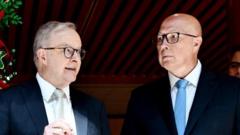In a gripping debate, Prime Minister Anthony Albanese and opposition leader Peter Dutton tackled pressing issues, with economic challenges taking center stage as the nation readies for a closely contested election.
Albanese versus Dutton: A Challenging Debate as Australia Approaches Election Day

Albanese versus Dutton: A Challenging Debate as Australia Approaches Election Day
Australia's first election debate between Prime Minister Albanese and challenger Dutton highlights economic concerns ahead of the May vote.
In the lead-up to Australia's federal election on May 3, Prime Minister Anthony Albanese and Opposition Leader Peter Dutton faced off in their first debate, primarily focusing on pressing economic issues. The event, organized by Sky News and The Daily Telegraph, featured questions from a panel of 100 undecided voters, where cost of living concerns resonated strongly with the audience. According to reports from ABC News, the vast majority of audience members acknowledged experiencing hardships related to rising living costs, prompting Dutton to describe the response as "a very confronting scene." Albanese, on the other hand, asserted that under his leadership, inflation has decreased, wages have increased, and interest rates are beginning to fall.
In addition to discussing economic policies, the candidates were queried about a potential fuel excise tax cut and the escalating costs of medical consultations. A key moment occurred when the moderators asked each leader to respond to US President Donald Trump's tariffs. Albanese emphasized Australia's readiness to negotiate better trade terms with the US, confidently stating that the nation is well-equipped to seek reciprocal tariff agreements. Dutton countered by highlighting his experience during negotiations with the Trump administration and stressed the importance of having a leader who stands firm against international pressures.
With opinion polls predicting a close race between the Labor Party and the Liberal Party, the possibility remains that either leader may need to collaborate with independent MPs or smaller parties to establish a government post-election. As the nation braces for the polls, both candidates have articulated their visions, catering to an electorate grappling with financial insecurity and demanding effective leadership.
In addition to discussing economic policies, the candidates were queried about a potential fuel excise tax cut and the escalating costs of medical consultations. A key moment occurred when the moderators asked each leader to respond to US President Donald Trump's tariffs. Albanese emphasized Australia's readiness to negotiate better trade terms with the US, confidently stating that the nation is well-equipped to seek reciprocal tariff agreements. Dutton countered by highlighting his experience during negotiations with the Trump administration and stressed the importance of having a leader who stands firm against international pressures.
With opinion polls predicting a close race between the Labor Party and the Liberal Party, the possibility remains that either leader may need to collaborate with independent MPs or smaller parties to establish a government post-election. As the nation braces for the polls, both candidates have articulated their visions, catering to an electorate grappling with financial insecurity and demanding effective leadership.



















